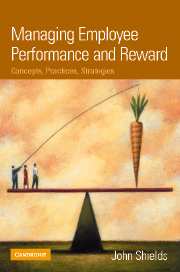Book contents
- Frontmatter
- Contents
- List of figures and tables
- Foreword by John Egan
- Acknowledgements
- Introduction: Setting the scene
- Part 1 The fundamentals
- Part 2 Performance management in action
- 5 Managing for results
- 6 Managing behaviour
- 7 Managing competencies
- 8 Performance review and development
- Case study. Delivering fairness: Performance assessment at Mercury Couriers
- Part 3 Base pay and benefits
- Part 4 Rewarding employee performance
- Part 5 Fitting it all together
- Model responses to case studies
- References
- Index
6 - Managing behaviour
from Part 2 - Performance management in action
- Frontmatter
- Contents
- List of figures and tables
- Foreword by John Egan
- Acknowledgements
- Introduction: Setting the scene
- Part 1 The fundamentals
- Part 2 Performance management in action
- 5 Managing for results
- 6 Managing behaviour
- 7 Managing competencies
- 8 Performance review and development
- Case study. Delivering fairness: Performance assessment at Mercury Couriers
- Part 3 Base pay and benefits
- Part 4 Rewarding employee performance
- Part 5 Fitting it all together
- Model responses to case studies
- References
- Index
Summary
In chapter 2 we examined the nature and possible determinants of three major categories of work behaviour: membership behaviour, task behaviour (or work effort) and organisational citizenship behaviour. In this chapter, we examine the assessment processes and techniques associated with the management of work behaviour, the strengths, weaknesses and common problems of these behavioural assessment methods, and the situations in which each may be most and least appropriate.
Behavioural assessment can be defined as an approach to performance management that focuses primarily (although not necessarily exclusively) on observing, recording and measuring, appraising or assessing the work behaviour of individual employees over a designated period (typically annually, six-monthly or quarterly). Behavioural criteria are applied widely to both managerial and non-managerial employees in both the public and the private sectors. In Australia, for instance, 46 per cent of organisations use behaviourally based measures as part of their approach to performance management (Nankervis & Compton 2006: 88). Historically, behavioural assessment has been one of the hallmarks of individual ‘performance appraisal’, particularly in service work, and while results and competencies are assuming greater importance in performance management, behaviourally based assessment maintains a strong presence in performance management practices across a wide range of industries, organisations and work roles.
Since work behaviour must be measured and managed by means of human observation and judgement, behavioural assessment necessarily involves subjective judgement and, hence, is prone to human error and unreliability.
- Type
- Chapter
- Information
- Managing Employee Performance and RewardConcepts, Practices, Strategies, pp. 142 - 178Publisher: Cambridge University PressPrint publication year: 2007



